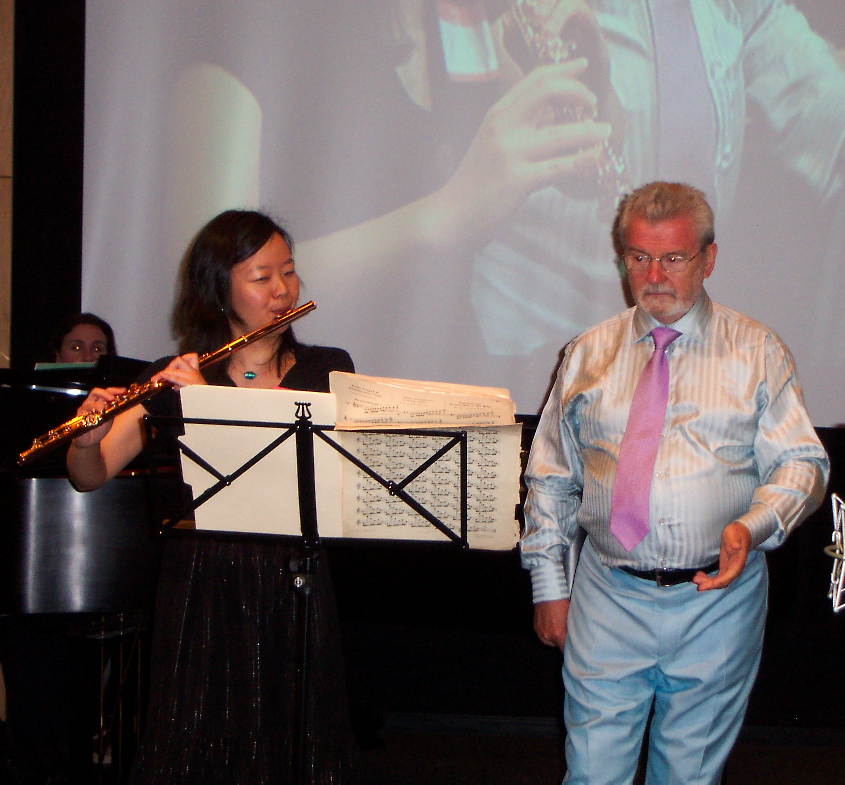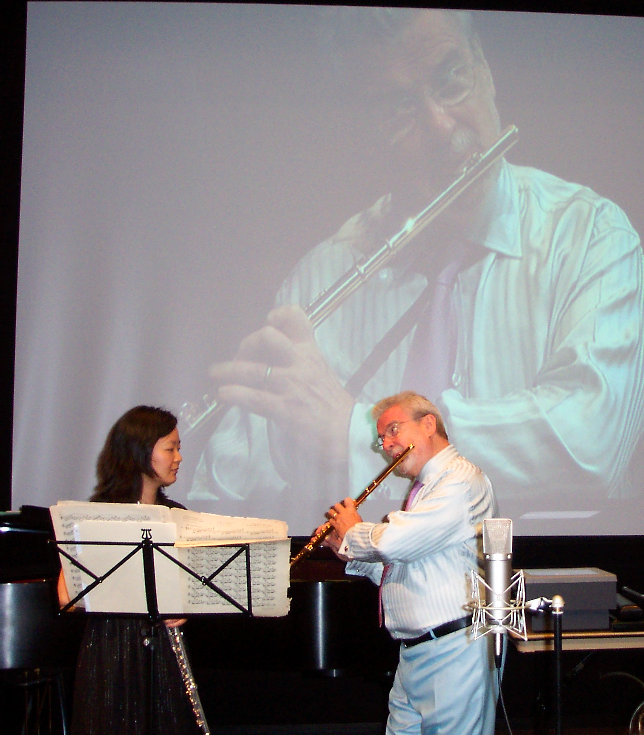The Writing Prompt: Phenomenon
“Something that is impressive or extraordinary; a remarkable or exceptional person; prodigy; wonder.”


As I mentioned previously, on July 15, 2007, I was honored to spend the day with Sir James and Lady Jeanne Galway at the Master Class in Napa. The way such a class works is: The first portion of the class is a general lecture and group warm-up. Those desiring to be “participants” submit a professional-quality recording in advance and Sir James selects four players to whom he will give instruction while the audience members — “auditors” — watch and learn.
Based upon the various videotapes of other classes that I have watched, as well as interviews, information posted on his website and the e-mails that Sir James sends to our discussion group, I knew that the opportunity to attend the class represented a once-in-a-lifetime chance to learn from a world-class flutist who has no equal.
I also have become aware of the years that I have been studying the flute that my teacher is also a world-class flutist and teacher, and I am very lucky to have the chance to learn from her. It is not unusual at all to receive direction from her from a lesson and just a few days later read precisely the same message from Sir James, as well as other highly accomplished flutists who are part of the e-mail group.

I was very curious to see, however, what teaching method(s) Sir James would employ, how he would deliver criticism, and whether such a brief lesson with him could, in fact, actually make a difference in one’s technique. In my profession, I encounter a lot of arrogance and self-importance, and I had heard rumors about Sir James’ level of arrogance. So I knew the day would be quite interesting.
Frankly, the rumors were true. Sir James does project an air of arrogance at time, but, as I told my friend during the lunch break, “I can tolerate a fair amount of arrogance — if the individual in question has the ‘goods’ to back it up.” And Sir James most certainly does.
I was extremely impressed with the manner in which he worked with the participants. First, he let them perform for an extensive period of time without interruption, listening intently as they played. You’ll never convince me to play poker with him because it as impossible to tell what he was thinking as he watched each performer.
When he had heard enough, he would stop them. Perusing their score, he would ask about why they phrased a passage a particular way, why they took a breath in a particular spot, what their teacher had recommended in certain difficult spots. I am certain that he as examining any notes placed upon their score. He worked to improve their intonation and interpretation, repeatedly stressing the beauty of the piece in question and suggesting ways to make it more interesting and “musical”.
All advice was given in a nonconfrontational manner, often accompanied by a funny story or remembrance and a demonstration — by memory, or course — of how it should sound.
Having brought several flutes with him, including a couple of his gold Nagaharas, he offered participants a chance to repeat their performance of a section using his flute, drawing a gasp from the audience the first time he handed one of his instruments to a student. Naturally, her playing sounded markedly better — of course, Sir James examined her flute and decreed that the keys were wobbling horizontally when they should only open and close in a vertical manner!
Of particular interest to me was the manner in which he approached correcting one participant who had an unbelievably annoying habit of waving her arms and upper body about as she played, slamming her rights into her sides at the end of each phrase. While she was playing, my friend and I looked at each other quizzically because our teacher would never tolerate such histrionics! But whatever Sir James was thinking remains a mystery — there was no clue in his expression.
When she finished her performance, he began working with her on a variety of points but did not mention her bizarre movements. My friend and I kept looking at each other in amazement, wondering when he was going to broach that subject. Many other audience members were wondering the same thing.

Finally, after he had carefully analyzed a couple of difficult passages with her, he turned to walk back over to his chair and said nonchalantly, “Now play that section again and this time, stand still.”
“That’s it?” I thought to myself. “That’s all he’s going to say about it?” That was all he needed to say. The participant paused and looked at him, studying his face upon which there was now the slightest grin. And then he asked her in an off-the-cuff manner with his lilting Irish brogue, “You didn’t think all that moving around was helping your embouchure, did you?” Everyone laughed with relief that the elephant in the room had finally been christened, and then he proceeded to explain to her how her movements were destroying her otherwise beautiful tone and causing her to chop off the ends of the phrases in a decidedly nonmusical way.
“[Y]ou can never tell the moment when a friend will no longer be there and one should really treasure every moment with friends, colleagues and the ones we love.” ~ Sir James Galway ~
And then she played the section of the piece again standing almost perfectly still. Beautifully. The improvement was remarkable.
And that’s when I knew for sure that I was in the presence of not only a very great musician, but a very great teacher. And an extremely gentle and kind human being.
I have encountered other professionals who have achieved the kind of success in their chosen field that Sir James has — he is, of course, Sir James, having been knighted by Queen Elizabeth in 2001 for his services to music — who are cruel and condescending to less accomplished individuals, and possess no aptitude for teaching. So I was delighted to see that Sir James exhibited a genuine interest in assisting the participants become better flutists. I was gratified to witness his genteel, almost playful, approach to working with the performers and amazed at how effortlessly he improved their performances in just a few short minutes.
And I was again reminded of how blessed I am to receive such excellent, comparable instruction from my own teacher right here in “Livable, Lovable Lodi”. As I have written about here before, I dreamed of playing the flute my entire life and only made the dream a reality a few short years ago.
As I told Lady Jeanne as the day was winding down, 2007 has been a remarkable year so far. Not only did I get to play my flute at Carnegie Hall with the Delta Winds on March 28, 2007, I was able to attend the Master Class and, at long last, meet the phenomenal Galways. I have been so blessed by these experiences that words are inadequate to express my feelings.
And that, of course, leads to the inevitable question: What next?

7 Comments
Thanks for sharing this experience. I love James Galway! He really is amazing. Ireland certainly does produce its share of deeply passionate, intelligent talent! I especially appreciate your sharing his teaching technique. As a teacher, I’m always watching to learn from others, and I’ve learned plenty through you this a.m. Great stuff. God bless your Sunday.
What an amazing experience to share. Thank you.
Happy BYB Sunday.
How wonderful to follow your link and read of Sir James Galway. I remember him from his early television days not only as an excellent flautist but as a warm humoured man with sparkling smile and wit. Some are blessed with great talent but we in turn are blessed by their performances. Best Wishes.
I am glad that Sir Galway handled the woman’s movements in a gentle manner. We can never be sure if someone has a neural problem that causes the weird tics we see.
I would say he is a world-class teacher for his ease of handling that situation.
You have been blessed indeed with your teachers.
We are blessed to share your experiences.
Have a great week.
CyberCelt, that is an extremely astute and important observation. There was nothing about her movements other than when she was playing that would suggest such a diagnosis. However, we must always be mindful of the possibility that another’s behavior could be caused by an underlying physical or mental disability or medical condition of which we are unaware.
Thanks for pointing that out.
Nice experience. Playing the flute is one of the best ways to spend your free time in a peaceful and relaxed atmosphere.
It certainly is. I love the time that I spend practicing and performing . . . couldn’t live without music.
Thanks for visiting!